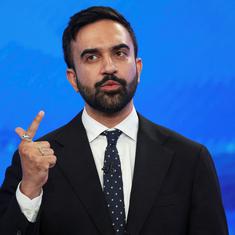Raghuram Rajan finally has a successor. The much anticipated announcement came early evening on Saturday. Urjit Patel will be the new Reserve Bank of India Governor.
Patel has been one of the four deputy governors at the RBI for more than three years and has held important positions at the International Monetary Fund as well as the Ministry of Finance in the past.
Patel holds a doctorate in economics from Yale University. He did his M Phil from Oxford and BSc in economics from University of London.
Before joining the RBI, Patel worked with Reliance Industries as President (Business Development) between 2008-2009. Before that, he was non-resident India Economics Fellow at Brookings Institution between 2006-2007 and executive director at IDFC between 1997-2006. He served as a consultant to the finance ministry between 1998-2001.
While Patel’s credentials seem to be almost on par with Rajan’s glittering resume, he is bound to face trouble filling the exceptionally large shoes of his predecessor, who managed to quickly fix some of the more pressing problems of the Indian economy.
However, it is unlikely that Patel is going to be much different from Rajan on at least one count – targeting inflation.
Patel’s promotion to the top post in the RBI comes as a signal from the government that it is no mood to waver off the monetary policy regime that Rajan cemented during his tenure. While there was loud criticism from a section of voices towards the end of Rajan’s three year term, alleging that he obstructed growth by not lowering interest rates, Patel is likely to follow in his footsteps.
Rajan’s departure was seen by many as the Modi government’s irritation with his “hawkish” stance on inflation but Patel’s appointment is going to disappoint some of Rajan’s critics, including the firebrand Bharatiya Janata Party leader Subramanian Swamy. "Don't be an idiot," Swamy said on Twitter, in response to a tweet that said Patel would be hawkish for sure and wondered whether Swamy would attack him for having been born in Kenya.
Patel has often been dubbed Rajan’s lieutenant when it comes to countering inflation, and those who argue that growth is being stalled due to high interest rates aren’t going to be too happy.
Patel has already played an instrumental role in cementing the monetary policy committee regime which is expected to be formulated by the end of this month through an expert committee that he led three years ago. The committee recommended formation of a six-member panel to decide on RBI’s monetary policy action. The power to raise or lower the interest rates will thus no longer be at the sole discretion of the RBI governor.
More accountability
Patel was among those who argued for more accountability from the Reserve Bank of India and his committee suggested that the RBI focus on Consumer Price Index as its anchor rather than the Wholesale Price Index which doesn’t represent the true picture of prices for most of the country.
“Movements in WPI often reflect large external shocks. Moreover, it is often subject to large revisions,” the committee stated in its report.
“The true inflation that consumers face is in the retail market. Although price indices that relate to consumer expenditures are at best imperfect, they are still close indicators of the cost of living. The choice of CPI establishes ‘trust’ viz., economic agents note that the monetary policy maker is targeting an index that is relevant for households and businesses.”
This report also suggested an inflation target be set for the RBI, in consultation, with the government that would make the central bank more accountable for its action and provide clear goalposts. Barely two weeks back, the government and the RBI settled on an inflation target of 4% for the next five years with an allowance of 2% on either side.
In the event that inflation moves beyond the specified levels, the RBI is now supposed to write to the government and explain the reasons behind the same and also iterate actions being taken to correct the same.
This clearly implies that Patel not only has his task cut out when he assumes office on September 5, but he also knows the challenges inside out. While the markets are no longer too bullish on rate cuts now that Patel has been given the charge of RBI as opposed to other inflation “doves” – people presumed to be in favour of cutting rates who were seen as being in contention – it is a clear signal of the continuity of the Rajan regime.
“The continuity will come in terms of taking Rajan’s inflation fighting agenda forward and not swaying from the regulator’s crusade against bad loans in the banking sector,” Ira Dugal wrote in Mint on Saturday. “Patel, in fact, is the architect of the RBI’s new monetary policy framework.”
Urjit Patel is going to be the 24th Reserve Bank Governor and apart from his stance on inflation, there’s much to look forward to. The cleaning of bank balance sheets due to non-performing assets or bad loans has just begun, monetary policy committee is yet to kick in and evolution of the foreign exchange market remains a constant challenge.
Mostly, it will be hard for him to come close to Rajan’s candidness on a range of socio-economic issues as Patel has rarely been at the forefront of communicating RBI’s strategy – or his own stance on issues.
Rajan is bound to be missed but, hopefully, not too much.










